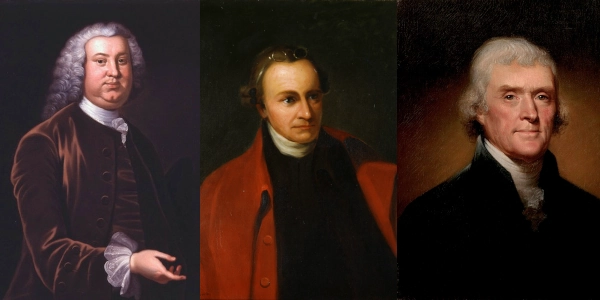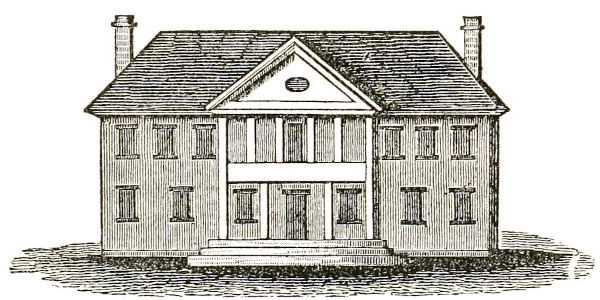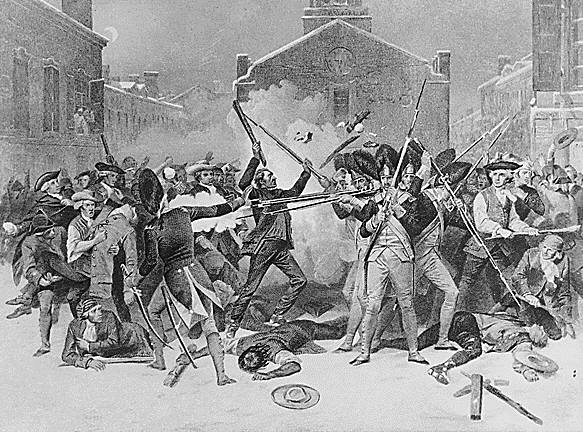Sponsor this page for $75 per year. Your banner or text ad can fill the space above.
Click here to Sponsor the page and how to reserve your ad.
-
Timeline
1773 Detail
March 12, 1773 - The House of Burgesses in the Colony of Virginia reacts strongly against British policies by setting up a committee to contact the other colonies about their common defense. They issue the Virginia Resolutions Establishing A Committee of Correspondence.

The Virginia House of Burgesses, like many of the other colonial legislatures had spent nearly twenty years locking horns over the legislative edicts from Parliament. Whether that be control of the Iron trade, taxes on stamps, or taxes on everything else, even if some of them had been repealed. There was, however, that tax still on tea, just to show the colonies they still held power. And then there was the Quartering act, the policies in many colonies that British soldiers and British masters were in control and not the colonists themselves that was bringing a conflict into sight.
Already a Boston Massacre three years before, the Watauga Association in East Tennessee trying to go it alone without British involvement in 1772, the torching of the revenue ship HMS Gaspee, and the Massachusetts Committee of Correspondence already established by Samuel Adams. The Boston Pamphlet had been getting good responses from many of the towns in the colony with one hundred and nineteen responding favorably out of two hundred and sixty.
It was time for Virginia to catch up. They had heard of the Gaspee Commission and its power to turn evidence and suspects over to Imperial authorites from a report in the Virginia Gazette. But Richard Henry Lee wanted a more accurate account, and wrote to Samuel Adams. When Adams corresponded back, Lee promised the Massachusetts legislature that he would bring the matter up in the next House of Burgess session. Richard Henry Lee, Thomas Jefferson, Patrick Henry, George Washington, and the remainder of the burgesses arrived for the session at the end of February. They were aghast that a counterfeit problem in Virginia was going to be treated in a similar fashion, the suspects brought to trial in Williamsburg and that the imperial authorities could remove them to England. Patrick Henry had always been against the idea of removing colonial offenders for trial in England, and not allowing colonial officials to handle their own affairs.
The session of the House of Burgesses began on March 4, with Patrick Henry demanding an investigation into the counterfeiting affair from Royal Governor Dunmore. By March 11, the entire House of Burgesses adopted a resolution disapproving of the Governor's actions. The resolution was a minimal effort to the more radical elements of the House, so Patrick Henry, Thomas Jefferson, Richard Henry Lee, brother Francis Lightfoot Lee, and Dabney Carr met at Raleigh Tavern to discuss British tyranny and whether the older members of the House would be able to act if times required, and that they should be in agreement with the other colonies in an act of unity.
On March 12, 1773, they recommended that a Committee of Correspondence be created to form those bounds in an intercolonial manner. The resolution to create passed unanimously.
Full Text, Virginia Resolutions Establishing A Committee of Correspondence
Virginia Resolutions Establishing A Committee of Correspondence; March 12, 1773
Whereas, the minds of his Majesty's faithful subjects in this colony have been much disturbed by various rumours and reports of proceedings tending to deprive them of their ancient, legal, and constitutional rights.
And whereas, the affairs of this colony are frequently connected with those of Great Britain, as well as of the neighbouring colonies, which renders a communication of sentiments necessary; in order, therefore, to remove the uneasinesses and to quiet the minds of the people, as well as for the other good purposes above mentioned Be it resolved, that a standing committee of correspondence and inquiry be appointed to consist of eleven persons, to wit: the Honourable Peyton Randolph, Esquire; Robert Carter Nicholas, Richard Bland, Richard Henry Lee, Benjamin Harrison, Edmund Pendleton, Patrick Henry, Dudley Digges, Dabney Carr, Archibald Cary, and Thomas Jefferson, Esquires, any six of whom to be a committee, whose business it shall be to obtain the most early and authentic intelligence of all such Acts and resolutions of the British Parliament, or proceedings of administration, as may relate to or affect the British colonies in America, and to keep up and maintain a correspondence and communication with our sister colonies, respecting these important considerations ; and the result of such their proceedings, from time to time, to lay before this House.
Resolved, that it be an instruction to the said committee that they do, without delay, inform themselves particularly of the principles and authority on which was constituted a court of inquiry, said to have been lately held in Rhode Island, with powers to transmit persons accused of offences committed in America to places beyond the seas to be tried.
The said resolutions being severally read a second time, were, upon the question severally put thereupon, agreed to by the House, nemine contradicente.
Resolved, that the speaker of this House do transmit to the speakers of the different assemblies of the British colonies on the continent, copies of the said resolutions, and desire that they will lay them before their respective assemblies, and request them to appoint some person or persons of their respective bodies, to communicate from time to time with the said committee.

What Happened Next
The committee sent a letter on March 19, 1773, written by Peyton Randolph, to the other colonial assemblies.
"I have received the commands of the House of Burgesses of this colony to transmit to you a copy of the resolves entered into by them on the 12th instant, which they hope will prove of general utility, if the other colonies shall think fit to adopt them. They have expressed themselves so fully as to the motives that led to these resolutions, that I need not say any thing on that point; and shall only beg you will lay them before your Assembly as early as possible, and request them to appoint some of their body to communicate from time to time with the corresponding committee of Virginia," Peyton Randolph.
By the end of the year, Committees of Correspondence had been set up in Rhode Island, Connecticut, New Hampshire, and South Carolina. By February 1774, eleven of the original colonies had formed one; all but North Carolina and Pennsylvania had not. North Carolina remedied that in December 1773; Pennsylvania on May 20, 1774.
Virginia Governor Dunmore gave the committee's creation short shrift, calling it a bout of "a little ill humor." However that bout was about to form a bond between the colonies that would eventually lead to the common defense, the Continental Army, that the British would be facing within two years.
Image above: Montage (left) Peyton Randolph, prior to 1755,
John Wollaston the Younger. Courtesy Virginia Historical Society via Wikipedia Commons; (center) Patrick Henry, 1891, George Bagby Matthews. Courtesy U.S. Senate via Wikipedia Commons; (right) Thomas Jefferson, 1801, Rembrandt Peale. Courtesy White House Collection via Wikipedia Commons. Image below: Engraving of the second Capitol building, 1754, in Williamsburg, where the House of Burgesses met, 1845, author unknown. Courtesy Wikipedia Commons. Info Source: Virginia General Assembly. House of Burgesses Journals of the House of Burgesses of Virginia, 1659, The Colonial Press, E. Waddey Co., 1914, via the Avalon Project, Documents in Law, History, and Diplomacy, Yale Law School; Massachusetts Historical Society; ouramericanrevolution.org; Wikipedia Commons.

Back to Index
History Photo Bomb

Already a Boston Massacre three years before, the Watauga Association in East Tennessee trying to go it alone without British involvement in 1772, the torching of the revenue ship HMS Gaspee, and the Massachusetts Committee of Correspondence already established by Samuel Adams. The Boston Pamphlet had been getting good responses from many of the towns in the colony with one hundred and nineteen responding favorably out of two hundred and sixty.
It was time for Virginia to catch up. They had heard of the Gaspee Commission and its power to turn evidence and suspects over to Imperial authorites from a report in the Virginia Gazette. But Richard Henry Lee wanted a more accurate account, and wrote to Samuel Adams. When Adams corresponded back, Lee promised the Massachusetts legislature that he would bring the matter up in the next House of Burgess session. Richard Henry Lee, Thomas Jefferson, Patrick Henry, George Washington, and the remainder of the burgesses arrived for the session at the end of February. They were aghast that a counterfeit problem in Virginia was going to be treated in a similar fashion, the suspects brought to trial in Williamsburg and that the imperial authorities could remove them to England. Patrick Henry had always been against the idea of removing colonial offenders for trial in England, and not allowing colonial officials to handle their own affairs.
The session of the House of Burgesses began on March 4, with Patrick Henry demanding an investigation into the counterfeiting affair from Royal Governor Dunmore. By March 11, the entire House of Burgesses adopted a resolution disapproving of the Governor's actions. The resolution was a minimal effort to the more radical elements of the House, so Patrick Henry, Thomas Jefferson, Richard Henry Lee, brother Francis Lightfoot Lee, and Dabney Carr met at Raleigh Tavern to discuss British tyranny and whether the older members of the House would be able to act if times required, and that they should be in agreement with the other colonies in an act of unity.
On March 12, 1773, they recommended that a Committee of Correspondence be created to form those bounds in an intercolonial manner. The resolution to create passed unanimously.
Whereas, the minds of his Majesty's faithful subjects in this colony have been much disturbed by various rumours and reports of proceedings tending to deprive them of their ancient, legal, and constitutional rights.
And whereas, the affairs of this colony are frequently connected with those of Great Britain, as well as of the neighbouring colonies, which renders a communication of sentiments necessary; in order, therefore, to remove the uneasinesses and to quiet the minds of the people, as well as for the other good purposes above mentioned Be it resolved, that a standing committee of correspondence and inquiry be appointed to consist of eleven persons, to wit: the Honourable Peyton Randolph, Esquire; Robert Carter Nicholas, Richard Bland, Richard Henry Lee, Benjamin Harrison, Edmund Pendleton, Patrick Henry, Dudley Digges, Dabney Carr, Archibald Cary, and Thomas Jefferson, Esquires, any six of whom to be a committee, whose business it shall be to obtain the most early and authentic intelligence of all such Acts and resolutions of the British Parliament, or proceedings of administration, as may relate to or affect the British colonies in America, and to keep up and maintain a correspondence and communication with our sister colonies, respecting these important considerations ; and the result of such their proceedings, from time to time, to lay before this House.
Resolved, that it be an instruction to the said committee that they do, without delay, inform themselves particularly of the principles and authority on which was constituted a court of inquiry, said to have been lately held in Rhode Island, with powers to transmit persons accused of offences committed in America to places beyond the seas to be tried.
The said resolutions being severally read a second time, were, upon the question severally put thereupon, agreed to by the House, nemine contradicente.
Resolved, that the speaker of this House do transmit to the speakers of the different assemblies of the British colonies on the continent, copies of the said resolutions, and desire that they will lay them before their respective assemblies, and request them to appoint some person or persons of their respective bodies, to communicate from time to time with the said committee.

"I have received the commands of the House of Burgesses of this colony to transmit to you a copy of the resolves entered into by them on the 12th instant, which they hope will prove of general utility, if the other colonies shall think fit to adopt them. They have expressed themselves so fully as to the motives that led to these resolutions, that I need not say any thing on that point; and shall only beg you will lay them before your Assembly as early as possible, and request them to appoint some of their body to communicate from time to time with the corresponding committee of Virginia," Peyton Randolph.
By the end of the year, Committees of Correspondence had been set up in Rhode Island, Connecticut, New Hampshire, and South Carolina. By February 1774, eleven of the original colonies had formed one; all but North Carolina and Pennsylvania had not. North Carolina remedied that in December 1773; Pennsylvania on May 20, 1774.
Virginia Governor Dunmore gave the committee's creation short shrift, calling it a bout of "a little ill humor." However that bout was about to form a bond between the colonies that would eventually lead to the common defense, the Continental Army, that the British would be facing within two years.
Image above: Montage (left) Peyton Randolph, prior to 1755, John Wollaston the Younger. Courtesy Virginia Historical Society via Wikipedia Commons; (center) Patrick Henry, 1891, George Bagby Matthews. Courtesy U.S. Senate via Wikipedia Commons; (right) Thomas Jefferson, 1801, Rembrandt Peale. Courtesy White House Collection via Wikipedia Commons. Image below: Engraving of the second Capitol building, 1754, in Williamsburg, where the House of Burgesses met, 1845, author unknown. Courtesy Wikipedia Commons. Info Source: Virginia General Assembly. House of Burgesses Journals of the House of Burgesses of Virginia, 1659, The Colonial Press, E. Waddey Co., 1914, via the Avalon Project, Documents in Law, History, and Diplomacy, Yale Law School; Massachusetts Historical Society; ouramericanrevolution.org; Wikipedia Commons.

Back to Index





